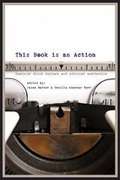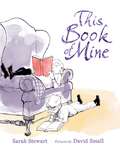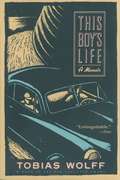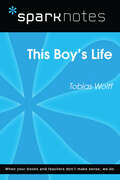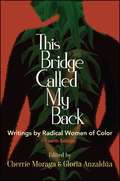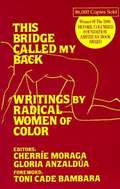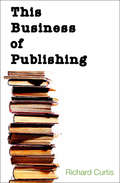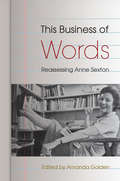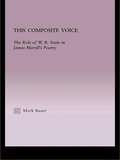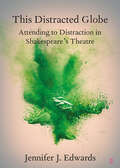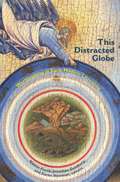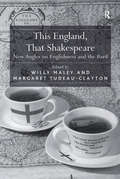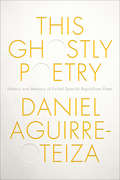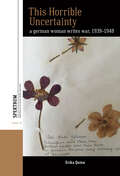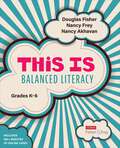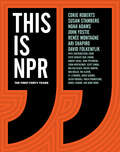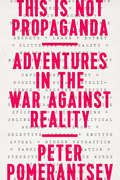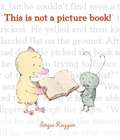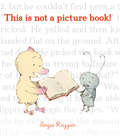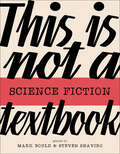- Table View
- List View
This Book Is an Action: Feminist Print Culture and Activist Aesthetics
by Cecilia Konchar Farr Jaime HarkerThe Women's Liberation Movement held a foundational belief in the written word's power to incite social change. In this new collection, Jaime Harker and Cecilia Konchar Farr curate essays that reveal how second-wave feminists embraced this potential with a vengeance. The authors in This Book Is an Action investigate the dynamic print culture that emerged as the feminist movement reawakened in the late 1960s. The works created by women shined a light on taboo topics and offered inspiring accounts of personal transformation. Yet, as the essayists reveal, the texts represented something far greater: a distinct and influential American literary renaissance. On the one hand, feminists took control of the process by building a network of publishers and distributors owned and operated by women. On the other, women writers threw off convention to venture into radical and experimental forms, poetry, and genre storytelling, and in so doing created works that raised the consciousness of a generation. Examining feminist print culture from its structures and systems to defining texts by Margaret Atwood and Alice Walker, This Book Is an Action suggests untapped possibilities for the critical and aesthetic analysis of the diverse range of literary production during feminism's second wave.
This Book of Mine: A Picture Book
by Sarah StewartA dazzling depiction of the connection between diverse readers of all ages and their books, from beloved author-illustrator team Sarah Stewart and David Small. This Book of Mine is a celebration of the power of reading, of the ways in which books launch our adventures, give us comfort, challenge our imaginations, and offer us connection. From new mothers to fantasy lovers, butterfly hunters to musicians, the readers of This Book of Mine all share a common passion for favorite books—whether freshly discovered at the library or bookstore or saved from childhood and reread across a lifetime. A unique gift for bibliophiles young and old, This Book of Mine trumpets a simple truth: A well-loved book in hand brings color to any reader’s life.
This Boy's Life
by Tobias WolffAutobiography of Wolff as a boy in the 1950s, by turns tough and vulnerable, crafty and bumbling. Separated by divorce from his father and brother, Toby and his mother are constantly on the move. As he fights for identity and self-respect against the unrelenting hostility of a new stepfather, his experiences are at once poignant and comical, and Wolff masterfully recreates the frustrations, cruelties, and joys of adolescence.
This Boy's Life (SparkNotes Literature Guide Series)
by SparkNotesThis Boy's Life (SparkNotes Literature Guide) by Tobias Wolff Making the reading experience fun! Created by Harvard students for students everywhere, SparkNotes is a new breed of study guide: smarter, better, faster.Geared to what today's students need to know, SparkNotes provides:*Chapter-by-chapter analysis *Explanations of key themes, motifs, and symbols *A review quiz and essay topicsLively and accessible, these guides are perfect for late-night studying and writing papers
This Bridge Called My Back: Writings by Radical Women of Color (Fourth Edition)
by Gloria Anzaldúa Cherríe Moraga<p>Originally released in 1981, This Bridge Called My Back is a testimony to women of color feminism as it emerged in the last quarter of the twentieth century. Through personal essays, criticism, interviews, testimonials, poetry, and visual art, the collection explores, as coeditor Cherríe Moraga writes, “the complex confluence of identities—race, class, gender, and sexuality—systemic to women of color oppression and liberation.” <p>Reissued here, nearly thirty-five years after its inception, the fourth edition contains an extensive new introduction by Moraga, along with a previously unpublished statement by Gloria Anzaldúa. The new edition also includes visual artists whose work was produced during the same period as Bridge, including Betye Saar, Ana Mendieta, and Yolanda López, as well as current contributor biographies. Bridge continues to reflect an evolving definition of feminism, one that can effectively adapt to, and help inform an understanding of the changing economic and social conditions of women of color in the United States and throughout the world.</p>
This Bridge Called My Back: Writings by Radical Women of Color (Second edition)
by Toni Cade Bambara Gloria Anzaldúa Cherríe MoragaThis Bridge Called My Back intends to reflect an uncompromised definition of feminism by women of color in the United States. Containing prose, poetry, personal narrative and analysis by Afro-American, Asian American, Latina, and Native American women, This Bridge Called My Back is divided into six powerful sections. * Children passing in the streets The Roots of Our Radicalism * Entering the lives of others Theory in the Flesh * And when you leave, take your pictures with you Racism in the Women's Movement * Between the lines On Culture, Class and Homophobia * Speaking in tongues The Third World Woman Writer * El Mundo Zurdo The Vision
This Bridge We Call Home: Radical Visions for Transformation
by Analouise Keating Gloria AnzaldúaThis anthology was inspired by This Bridge Called My Back: Writings by Radical Women of Color.
This Business of Publishing: An Insider's View Of Current Trends And Tactics
by Richard CurtisThis Business of Publishing has been hailed by literary agent Michael Larsen as &“must reading for writers, agents and anyone else who cares about the future of publishing.&” It reveals the unique perspective of Richard Curtis, former president of the Association of Authors&’ Representatives. He provides the aspiring author with the benefit of over thirty years of lessons learned in the publishing industry, including: the damage caused to the publishing industry by the archaic practice of selling books on consignment; the changing nature of the wholesale business and how it affects authors, editors, and agents; the way that large corporate mergers of publishing companies have brought about the disenfranchisement of authors and editors; and the electronic media revolution and the opportunities it offers, as well as the pitfalls. Curtis talks about the &“blockbuster mentality&” that currently dominates publisher thinking, leading to increased dependence on a few overpaid authors with big-name market status. This is an engaging and thoroughly readable guidebook to one of the most rapidly changing industries in America. It is an essential reference work for anyone hoping to understand or function in the publishing world.
This Business of Words: Reassessing Anne Sexton
by Amanda GoldenOne of America's most influential women writers, Anne Sexton has long been overshadowed by fellow confessional poets Sylvia Plath and Robert Lowell and is seldom featured in literary criticism. This volume reassesses Sexton and her poetry for the first time in two decades and offers directions for future Sexton scholarship. Mapping Sexton’s influence on twenty-first-century cultural contexts, these essays emphasize her continuing vitality. Contributors: Jeanne Marie Beaumont | Jeffery Conway | Jo Gill | Amanda Golden | Christopher Grobe | Anita Helle | Kamran Javadizadeh | Dorothea Lasky | Kathleen Ossip | David Trinidad | Victoria Van Hyning
This Composite Voice: The Role of W.B. Yeats in James Merrill's Poetry (Studies in Major Literary Authors #24)
by Mark A. BauerFirst Published in 2003. Routledge is an imprint of Taylor & Francis, an informa company.
This Distracted Globe: Attending to Distraction in Shakespeare's Theatre (Elements in Shakespeare Performance)
by Jennifer J. EdwardsThis Element attends to attention drawn away. That the Globe is a 'distracted' space is a sentiment common to both Hamlet's original audience and attendees at the reconstructed theatre on London's Bankside. But what role does distraction play in this modern performance space? What do attitudes to 'distraction' reveal about how this theatre space asks and invites us to pay attention? Drawing on scholarly research, artist experience, and audience behaviour, This Distracted Globe considers the disruptive, affective, phenomenological, and generative potential of distraction in contemporary performance at the Globe.
This Distracted Globe: Worldmaking in Early Modern Literature
by Jonathan Goldberg Karen NewmanWorldmaking takes many forms in early modern literature and thus challenges any single interpretive approach. The essays in this collection investigate the material stuff of the world in Spenser, Cary, and Marlowe; the sociable bonds of authorship, sexuality, and sovereignty in Shakespeare and others; and the universal status of spirit, gender, and empire in the worlds of Vaughan, Donne, and the dastan (tale) of Chouboli, a Rajasthani princess. Together, these essays make the case that to address what it takes to make a world in the early modern period requires the kinds of thinking exemplified by theory.
This England, That Shakespeare: New Angles on Englishness and the Bard
by Margaret Tudeau-ClaytonIs Shakespeare English, British, neither or both? Addressing from various angles the relation of the figure of the national poet/dramatist to constructions of England and Englishness this collection of essays probes the complex issues raised by this question, first through explorations of his plays, principally though not exclusively the histories (Part One), then through discussion of a range of subsequent appropriations and reorientations of Shakespeare and 'his' England (Part Two). If Shakespeare has been taken to stand for Britain as well as England, as if the two were interchangeable, this double identity has come under increasing strain with the break-up - or shake-up - of Britain through devolution and the end of Empire. Essays in Part One examine how the fissure between English and British identities is probed in Shakespeare's own work, which straddles a vital juncture when an England newly independent from Rome was negotiating its place as part of an emerging British state and empire. Essays in Part Two then explore the vexed relations of 'Shakespeare' to constructions of authorial identity as well as national, class, gender and ethnic identities. At this crucial historical moment, between the restless interrogations of the tercentenary celebrations of the Union of Scotland and England in 2007 and the quatercentenary celebrations of the death of the bard in 2016, amid an increasing clamour for a separate English parliament, when the end of Britain is being foretold and when flags and feelings are running high, this collection has a topicality that makes it of interest not only to students and scholars of Shakespeare studies and Renaissance literature, but to readers inside and outside the academy interested in the drama of national identities in a time of transition.
This Ghostly Poetry: Reading Spanish Republican Exiles between Literary History and Poetic Memory (Toronto Iberic)
by Daniel Aguirre-OteziaThe Spanish Civil War was idealized as a poet’s war. The thousands of poems written about the conflict are memorable evidence of poetry’s high cultural and political value in those historical conditions. After Franco’s victory and the repression that followed, numerous Republican exiles relied on the symbolic agency of poetry to uphold a sense of national identity. Exilic poems are often read as claim-making narratives that fit national literary history. This Ghostly Poetry critiques this conventional understanding of literary history by arguing that exilic poems invite readers to seek continuity with a traumatic past just as they prevent their narrative articulation. The book uses the figure of the ghost to address temporal challenges to historical continuity brought about by memory, tracing the discordant, disruptive ways in which memory is interwoven with history in poems written in exile. Taking a novel approach to cultural memory, This Ghostly Poetry engages with literature, history, and politics while exploring issues of voice, time, representation, and disciplinarity.
This Horrible Uncertainty: A German Woman Writes War, 1939-1948 (Spektrum: Publications of the German Studies Association #32)
by Erika QuinnThrough the diaries and personal papers of a German woman, Vera Conrad, this book documents her wartime experiences and deepens our understanding of the complex experiences of trauma and grief that National Socialist supporters experienced. Building on scholarship about mourning and widowhood that largely focuses on state policies and public discourses, This Horrible Uncertainty provides an interpretive framework of people’s perceptions of events and their capacity to respond to them. Using a history of emotions approach, Erika Quinn establishes that keeping the diary allowed Conrad to develop different selves in response to her responsibilities, fear, and grief after her husband was declared missing in 1943.
This Is Balanced Literacy, Grades K-6 (Corwin Literacy)
by Douglas Fisher Nancy Frey Nancy AkhavanThis is Balanced Literacy: Grades K-6 Students learn to read and write best when their teachers balance literacy instruction. But how do you strike the right balance of skills and knowledge, reading and writing, small and whole group instruction, and direct and dialogic instruction, so that all students can learn to their maximum potential? The answer lies in the intentional design of learning activities, purposeful selection of instructional materials, evidence-based teaching methods, and in strategic groupings of students based on assessment data. Together, these create the perfect balance of high impact learning experiences that engage and excite learners. In this hands-on essential guide, best-selling authors Douglas Fisher, Nancy Frey, and Nancy Akhavan help you define that balance for your students, lighting the path to implementing balanced literacy in your classroom. Their plan empowers you to integrate evidence-based approaches that include: • Instructional materials comprised of both informational and narrative texts. • The best uses of instructional delivery modes, including direct and dialogic instruction. • Grouping patterns that work best to accomplish learning aims for different learners at different stages. • Instruction in foundational skills and meaning making, including oral language, phonemic awareness, phonics, fluency, vocabulary, comprehension, and writing. • Technology used as a tool for increasing learning of a specific literary process. All the tips and tools you need to realize the goal of balanced literacy learning are included, with classroom videos that show strategies in action. Tap your intuition, collaborate with your peers, and put the research-based strategies embedded in this roadmap to work in your classroom to implement or deepen a strong, successful balanced literacy program. Grow as a reading and writing teacher while leading your students to grow as readers and writers.
This Is Balanced Literacy, Grades K-6 (Corwin Literacy)
by Douglas Fisher Nancy Frey Nancy AkhavanThis is Balanced Literacy: Grades K-6 Students learn to read and write best when their teachers balance literacy instruction. But how do you strike the right balance of skills and knowledge, reading and writing, small and whole group instruction, and direct and dialogic instruction, so that all students can learn to their maximum potential? The answer lies in the intentional design of learning activities, purposeful selection of instructional materials, evidence-based teaching methods, and in strategic groupings of students based on assessment data. Together, these create the perfect balance of high impact learning experiences that engage and excite learners. In this hands-on essential guide, best-selling authors Douglas Fisher, Nancy Frey, and Nancy Akhavan help you define that balance for your students, lighting the path to implementing balanced literacy in your classroom. Their plan empowers you to integrate evidence-based approaches that include: • Instructional materials comprised of both informational and narrative texts. • The best uses of instructional delivery modes, including direct and dialogic instruction. • Grouping patterns that work best to accomplish learning aims for different learners at different stages. • Instruction in foundational skills and meaning making, including oral language, phonemic awareness, phonics, fluency, vocabulary, comprehension, and writing. • Technology used as a tool for increasing learning of a specific literary process. All the tips and tools you need to realize the goal of balanced literacy learning are included, with classroom videos that show strategies in action. Tap your intuition, collaborate with your peers, and put the research-based strategies embedded in this roadmap to work in your classroom to implement or deepen a strong, successful balanced literacy program. Grow as a reading and writing teacher while leading your students to grow as readers and writers.
This Is Dyslexia
by Kate GriggsThe future needs Dyslexic Thinking!British social entrepreneur, founder and CEO of charity Made By Dyslexia, Kate Griggs has been shifting the narrative on dyslexia and educating people on its strengths since 2004. Having been surrounded by an extraordinary 'smorgasbord of Dyslexic Thinking' her whole life, Griggs knows the superpower of dyslexia all too well.Revised and updated, with new research and a forward from Sir Richard Branson, This is Dyslexia covers everything you need to understand, value and support Dyslexic Thinking. From offering practical advice on how to support the dyslexics in your life to breaking down the 6 Dyslexic Thinking skills in adults, Griggs shares her knowledge in an easily digestible guide.This is Dyslexia redefines and reshapes what it means to be dyslexic. It explores how it has shaped our past and how harnessing its powers and strengths is vital to our future.
This Is Me, Period.: The Art, Pleasures, and Playfulness of Punctuation
by Caz Hildebrand Philip CowellThe elements of style like you've never seen them beforeExplore the personalities of the punctuation marks we use every day with this bold, typographic journey through grammar. Each chapter in This is Me, Period introduces one of the major pieces of punctuation and all of its idiosyncracies, including:The dashing em dash— So-called "quotation marks"The colon: and on and onThe shouty exclamation!The three dots of . . . (Don't forget the brackets)And even moreAs charming as it is educational, This is Me, Period helps you understand sentence structure in a novel way that keeps you turning the pages for more.
This Is NPR: The First Forty Years
by Noah Adams Cokie Roberts David Folkenflik Susan Stamberg Ari Shapiro John Ydstie Renée MontagneA celebration of National Public Radio “full of short histories from familiar names . . . [a] retrospective illustrating just how much they have given us” (Publishers Weekly).“Always put the listener first” has been NPR’s mantra since its inception in 1970, and the result is that its programming attracts tens of millions of listeners every week. This beautifully designed volume chronicles the first forty years of NPR’s storied history, featuring dozens of behind-the-scenes photos, essays, and original reporting by a who’s who of NPR staff and correspondents, and transcripts of memorable interviews. Beyond an entertaining and inspiring tribute to NPR’s remarkable history, this book is an intimate look at the news and stories that have shaped our world, from the people who were on the ground and on the air. With contributions from: Steve Inskeep * Neal Conan * Robert Siegel * Nina Totenberg * Linda Wertheimer * Scott Simon * Melissa Block * P.J. O’Rourke * David Sedaris * Sylvia Poggioli * Ira Flatow * Paula Poundstone * Daniel Schorr * and many more One of Cool Hunter’s Top Five Books of the Year
This Is Not Propaganda: Adventures in the War Against Reality
by Peter PomerantsevWhen information is a weapon, every opinion is an act of war.We live in a world of influence operations run amok, where dark ads, psyops, hacks, bots, soft facts, ISIS, Putin, trolls, and Trump seek to shape our very reality. In this surreal atmosphere created to disorient us and undermine our sense of truth, we've lost not only our grip on peace and democracy--but our very notion of what those words even mean.Peter Pomerantsev takes us to the front lines of the disinformation age, where he meets Twitter revolutionaries and pop-up populists, "behavioral change" salesmen, Jihadi fanboys, Identitarians, truth cops, and many others. Forty years after his dissident parents were pursued by the KGB, Pomerantsev finds the Kremlin re-emerging as a great propaganda power. His research takes him back to Russia--but the answers he finds there are not what he expected.
This Is Not a Picture Book!
by Sergio RuzzierIn this quirky yet sweet picture book about the joy and power of reading, Duck learns that even books without pictures can be fun. While he and his friend Bug may struggle at first to decipher their book, they stick with it, and before long they discover that not only can they read it, but it deserves a place on the shelf with all their favorite picture books. Author-artist Sergio Ruzzier has created a fanciful tribute to books of all kinds. It includes both words AND pictures.
This Is Not a Picture Book!
by Sergio RuzzierIn this quirky yet sweet picture book about the joy and power of reading, Duck learns that even books without pictures can be fun. While he and his friend Bug may struggle at first to decipher their book, they stick with it, and before long they discover that not only can they read it, but it deserves a place on the shelf with all their favorite picture books. Author-artist Sergio Ruzzier has created a fanciful tribute to books of all kinds. It includes both words AND pictures. And because this is the fixed-format version, it looks almost identical to the print edition!
This Is Not a President: Sense, Nonsense, and the American Political Imaginary
by Diane RubensteinRead The Chronicle of Higher Ed Author InterviewIn This Is Not a President, Diane Rubenstein looks at the postmodern presidency — from Reagan and George H. W. Bush, through the current administration, and including Hillary. Focusing on those seemingly inexplicable gaps or blind spots in recent American presidential politics, Rubenstein interrogates symptomatic moments in political rhetoric, popular culture, and presidential behavior to elucidate profound and disturbing changes in the American presidency and the way it embodies a national imaginary.In a series of essays written in real time over the past four presidential administrations, Rubenstein traces the vernacular use of the American presidency (as currency, as grist for popular biography, as fictional TV material) to explore the ways in which the American presidency functions as a “transitional object” that allows the American citizen to meet or discover the president while going about her everyday life. The book argues that it is French theory — primarily Lacanian psychoanalysis and the radical semiotic theories of Jean Baudrillard — that best accounts for American political life today. Through episodes as diverse as Iran Contra, George H. W. Bush vomiting in Japan, the 1992 Republican convention, the failed nomination of Lani Guinier, and the Iraq War, This Is Not a President brilliantly situates our collective investment in American political culture.
This Is Not a Science Fiction Textbook (This Is Not a...Textbook)
by Mark Bould Steven ShaviroScience fiction as a vital bridge between technoscience and culture, an early warning system, a method for imagining differently.In the new millennium, science fiction has moved from the margins to the mainstream. At the same time, it has undergone massive transformations. No longer can it be derided as indigestible technobabble or escapist trash or a white man&’s playground—not that it ever really was. Sf is rich and diverse, serious, and fun. A vital bridge between technoscience and culture, it is an early warning system, a method for imagining differently, and a way of experiencing our increasingly science-fictional world. It is the vernacular of the 21st century. This Is Not A Science Fiction Textbook brings together leading sf scholars, including some of the most exciting new critical voices, to introduce the genre for the general reader. Its first part outlines some key ideas used to think about sf, such as Estrangement, Extrapolation, and Alterity. Its second part maps some of the genre&’s global history, from the Enlightenment and European colonialism to Indigenous and African Futurisms. Its third part surveys sf at the turn of the 2020s, organised by concepts, movements and new academic disciplines, from Afrofuturism and Animal Studies to Queer Theory and the Weird—and each chapter, whether it is on Climate Fiction or Neurodiversity, is accompanied by an introduction to a major contemporary novel and film.
